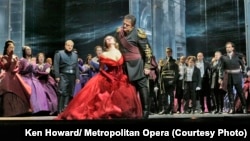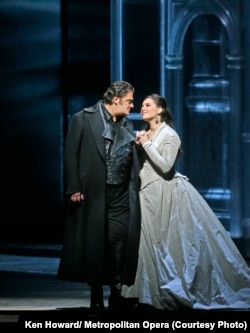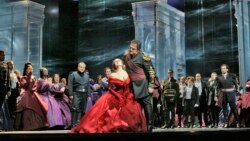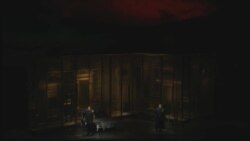Verdi's opera "Otello" is based on Shakespeare’s play about a North African general who becomes a war hero and tries to fit into high — white — society in Venice. It is renowned for its challenging vocals. For over a century, finding anyone to sing the lead part has been difficult. Finding a black singer to portray the Jealous Moor of Venice was next to impossible.
"I do not know of a black singer singing Verdi’s 'Otello' in a major opera house ever," said University of Michigan professor Naomi André, co-editor of the book Blackness in Opera.
However, Andre said, "I really believe we should have that opera performed and, hence, we’re going to need to make a decision about how do we handle the Moor, the black element of that role."
Performing in blackface
When "Otello" premiered at La Scala in Milan in 1887, the great Italian tenor Francesco Tamagno sang the role, in blackface. And ever since, tenors, including Placido Domingo and Luciano Pavarotti, have been darkening their skin to play the part.
But even opera must change with the times. So for the first time ever, when the Metropolitan Opera's new production of "Otello" opened in late September in New York, the white singer performing the title role was not wearing makeup to darken his complexion.
Production director Bartlett Sher never even considered having his Otello wear blackface.
"Our cultural history in America is profoundly marked by our struggles with race and the questions of race," he said. "And it seems to me, as an artist growing up in America, that there’d be no way on Earth I could possibly figure out how to do it with that kind of makeup, and that it just seemed like an obvious choice."
Colorblind casting
Otello is one of the toughest tenor roles in the world, according to Peter Gelb, Metropolitan Opera general manager. "There are only one or two singers in the world today who can even sing it on the large stage of the Met successfully," he said, "and we cast the best one available." Sher’s production stars Latvian tenor Aleksandrs Antonenko.
Gelb pointed out that the Met, like many other opera companies, has had a colorblind casting policy for over half a century. Some of the greatest black artists of all time, from Marian Anderson to Leontyne Price to Jessye Norman to Kathleen Battle, have graced its stage.
The list of black sopranos and contraltos singing major opera roles is longer than the list of black tenors, baritones and bassos, and André said there’s a reason for that.
"Seeing a black male singer onstage with a white female heroine, there would be anxiety that a lot of people could feel in days of segregation, even in post-segregation times, where racial tensions are still very much around," she said. "So I think that was an additional barrier that black men faced — getting on the opera stage."
Also, the classic European art form, which began in Italy at the end of the 16th century, has not offered many black role models until recently. "A lot of times," André said, "with African-American or black singers, there’s a feeling of, 'Well, I don’t see a lot of people looking like me onstage.' So negative things are reinforced, instead of encouraging people to go."
But times are changing. André pointed to African-American opera stars like bass-baritone Eric Owens and tenor Lawrence Brownlee. And other countries, like South Africa, which has a special program to develop opera singers, are contributing to the trend.
WATCH: An excerpt from "Otello": Si, pel ciel








